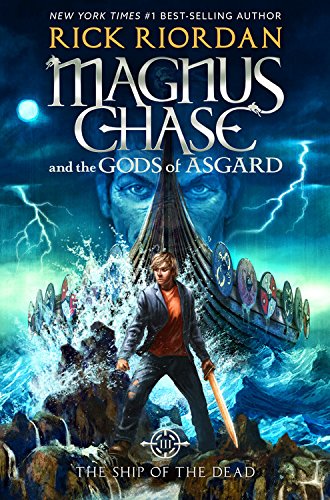Rick Riordan has returned with his fall gift to readers with book three of the Magnus Chase and the Gods of Asgard series The Ship of the Dead. Famous for his work in igniting interest in Greek, Roman, and Egyptian mythology in middle school readers all over the planet, Riordan brings his lyrical touch to the world of Norse mythology and Vikings, and hits another home run for literature.
Magnus Chase is a dead kid, resurrected by a Valkyrie named Sam to be an einherjar, a warrior of Odin who will battle at doomsday which is known as Ragnarok in Norse. Magnus is a teenager who in the first two books of the series has acquired a group of friends that are working together to stop the end of the world.
Together the group of heroes set out to recapture the escaped god Loki, from sailing free and starting Ragnarok. They must make it to the ship of the dead, which Loki is on, and planning to use to begin doomsday.
My Opinion
It’s clear at the end of this book, that Magnus Chase’s story is over and done. Sure, there are always more stories to tell, but the arc of the story was executed perfectly in this trilogy. I like that Magnus Chase is done. Sometimes you just need to end a story.
Rick Riordan has not only written an entertaining book with all the details that relate to Norse mythology and the Vikings, but he has managed to take a story about heroes and gods, and turned it into a story about finding your family. This Viking world with the monsters that lurk around every corner, is a place that Magnus Chase is trying to find his place.
Being an undead teenager, Magnus is forced into a world that he doesn’t know and must relate to relatives that are more distant to him than anyone could imagine. With gods appearing and giants trying to kill him, Magnus chooses to build his family from the friends that surround him.
The Hotel Valhalla, where all the einherjar live and train for Ragnarok is the ideal place with thousands to live out eternity for the one moment when the world ends and the final battle consumes every living thing. But Magnus in this place of waiting for death, makes a life out of everything he is surrounded by. Magnus is more alive now as a dead warrior then he ever was as a kid.
His friends consist of a dead Viking warrior named Halfborn Gunderson, a former Irish terrorist named Mallory Keen, Thomas Jefferson Jr. an African American veteran of the Civil War, a Muslim teen named Sam who is also a Valkyrie, and a gender fluid character named Alex who can shapeshift to anything they want. With his dwarf and elf friends Blitzen and Hearth, Magnus has a sizable group of allies that he can learn from, and grow with.
Magnus gains humility and strength not from being the son of the god Frey, but from the friendships he has formed. His ultimate success will not be from the help he gains from the gods, but rather from the friends he has made.
Then there’s Loki. Whereas characters like Odin are portrayed as a suit-wearing motivational speaker, and Thor is nothing like the heroic warrior the comic world has chosen to portray, we don’t really see much of the gods, but Loki is a different matter. The principal villain in this series, his escape has set off a chain of events that brings the world closer to Ragnarok.
Loki is not a good guy. His teasing and taunting of Magnus, and his horrible treatment of his children Alex and Sam show how narcissistic and self-centered he is. Loki is only interested in one thing, and that is Loki. His freedom has cost the lives of many, and his one and only goal is to destroy the world, simply because he wants too. What kind of maniacal person thinks like that?
Rick Riordan makes his Loki a god who has no conscience, no feeling, except for glee when others suffer. But what Riordan does for his readers is not to set up a destructive explosive battle, but instead a contest of insults. Explosions can be big, but words are the most destructive weapon anyone has, and Loki has been detested for the power of his tongue. The silver-tongued god has often manipulated millions of people in his time, and now Magnus Chase must defeat Loki at his own game.
There are many moments of humor throughout the book, but Riordan has also stitched a lot of social issues into this book that comment on the nature of the world today. Having the character Alex be gender fluid, constantly switching from male to female, challenges readers perception on what is an identity. Riordan further pushes the questions that a reader might have about Alex by using Magnus as our talking piece. The acceptance and love that Magnus has for Alex will no doubt help kids understand and accept that we are all different and that gender identity doesn’t need to define us.
One of Magnus’ other friends, Sam, is a Muslim who is observing Ramadan. She is portrayed as a strong, loyal, and disciplined friend and fighter, and no doubt provides a contrasting view to some current stereotypes. We are defined by our actions and not the labels that society has placed upon us. Riordan makes the reader see this through his story, and he must be credited with furthering the discussion on the prejudice that is evident in the world, and how society needs to move past it.
I don’t need to tell Riordan fans to read this book, they will. If you have not explored the world through Magnus Chase, do it! Do it now, and enjoy.

